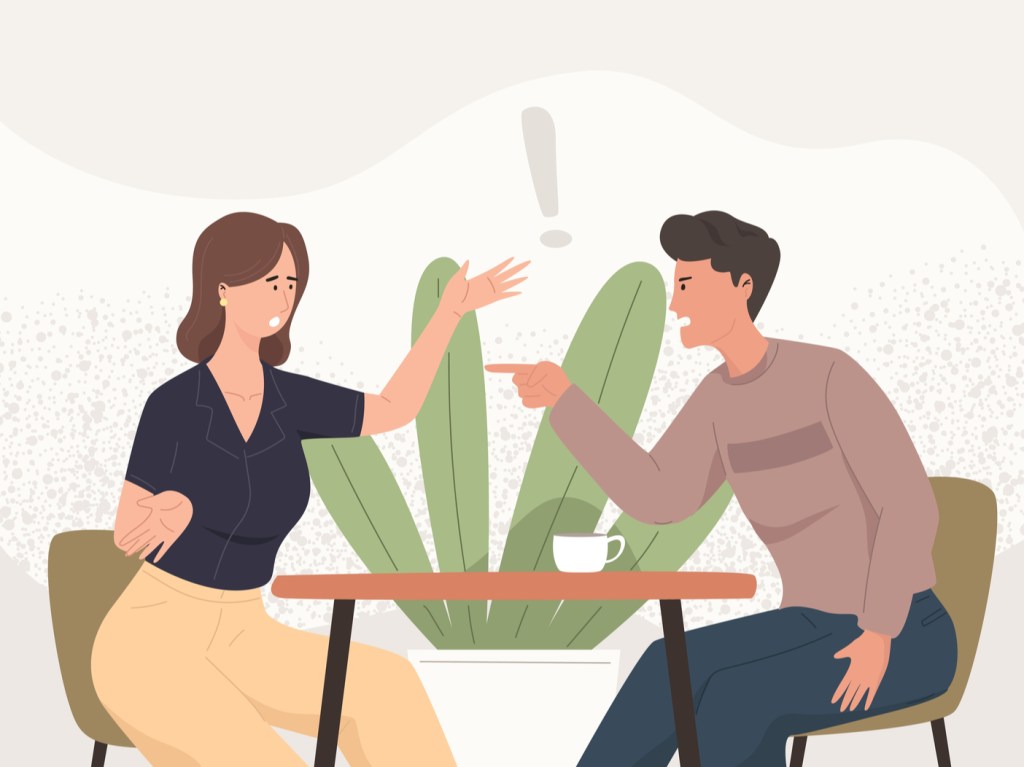Humans are complicated, chaotic creatures. So, it’s unsurprising that marriage—a contractual, legal binding of two such creatures—is perhaps the most complex human experience of all. On paper, the deal looks pretty good. But it rarely lives up to its original promise.
Videos by Suggest
Cohabitating with the same person for the rest of your life is bound to have some pitfalls. Sure, you promised to be with each other until death does you part. But that doesn’t mean you have to like them the whole time.
Author Heather Havrilesky poses this idea in her book, Foreverland: On the Divine Tedium of Marriage. She argues that hating your husband doesn’t necessarily mean you have a bad marriage. Nor does it have to be a red flag signaling the start of one.
According to Havrilesky (and married women everywhere), hating your husband is more normal than you might think.
Marriage Requires Amnesia
Spousal tension is as American as apple pie. From the Bundys in Married… with Children to the Kramdens of The Honeymooners, the media has portrayed marriages as largely unhappy since the mid-20th century. Yet, when the New York Times featured Havrilesky’s essay, “Marriage Requires Amnesia,” the backlash was swift and fierce.
“Do I hate my husband? Oh, for sure, yes, definitely,” Havrilesky wrote. “I don’t know anyone who’s been married more than seven years who flinches at this concept. A spouse is a blessing and a curse wrapped into one. How could it be otherwise?”
Havrilesky described her husband in not-so-savory terms—at one point likening him to a dirty pile of laundry. But she also described him lovingly. Like the concept of marriage itself, her essay is full of nuance.
“Marriage is a solution to several problems that creates infinite additional problems. Marriage can cure your loneliness or exacerbate it. Each week is a little different than the last,” Havrilesky wrote. “Love and hate are birds of a feather. I need you. Therefore, I hate you.”
Addressing The Backlash
One week after the New York Times published her essay, Havrilesky returned to her virtual soapbox, this time on Ask Polly, to clarify. The backlash she received showed readers were missing a crucial point. Havrilesky wasn’t advocating for the acceptance of hatred; she was advocating for the opposite.
“My book isn’t about how terrible my husband is,” Havrilesky wrote in her rebuttal. “It’s about how hard it is to be a conflicted mortal chained to another mortal. I’m promoting acceptance of your flawed self, which makes it possible to accept other people’s flaws and the deeply flawed universe outside your door.”

Havrilesky’s book wasn’t suggesting that all marriages be miserable. Rather, she’s proposing we give ourselves the freedom to feel all the feelings. “Defending your right to feel irritation and impatience and random bouts of misdirected lust is the same thing as defending your right to feel joy.”
It’s within this space, Havrilesky argued, that we get to appreciate the beauty of marriage. “Noticing that you feel rage and hatred and longing and love… that’s what makes you feel more alive. That’s what allows you to not just tolerate, but enjoy bumps and falls [in your marriage].”
Hating your husband doesn’t mean you have a failed marriage or a bad spouse. In fact, it’s a sign that you’re paying attention.
Yep, You Can Hate Your Husband
Marriage can be a joyous, beautiful thing. But it can and often is taxing, unsavory, unpleasant, and riddled with conflict. To deny ourselves that reality is to deny a critical truth about relationships. These bonds are constantly in flux, just like us.
Accepting this truth opens the door to having more meaningful long-term connections. We allow ourselves to see every part of our partner: the good, the bad, and the ugly. In turn, we allow them to see every part of us.
This balancing act isn’t just for your husband’s benefit. It’s for yours, too. If we can see our partner’s flaws and weaknesses and still love them, then it stands to reason that we can be loved, too—flaws, weaknesses, and all. Accepting your husband makes accepting yourself a little bit easier.
Of course, no two relationships are exactly alike. Moreover, this concept doesn’t negate the existence of abusive and unhealthy partnerships. But for otherwise healthy couples, the occasional bout of aversion is nothing to call the divorce lawyer about.
It might seem counterintuitive at first, but accepting the hatred you feel might just be the thing you need to fall even deeper in love.
More From Suggest
If You’re Tired Of Arguing About Chores, This Just Might Save Your Marriage
‘Weaponized Incompetence’ Is The Latest Tactic Men Are Using To Get Out Of Helping Around The House
